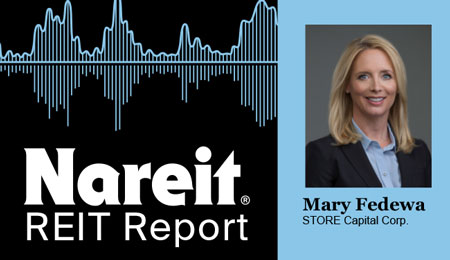 STORE Capital Corp. (NYSE: STOR) President and COO Mary Fedewa says that after six years as a public company, the net lease REIT has “barely scratched the surface” in terms of tapping potential opportunities for growth.
STORE Capital Corp. (NYSE: STOR) President and COO Mary Fedewa says that after six years as a public company, the net lease REIT has “barely scratched the surface” in terms of tapping potential opportunities for growth.
Speaking on the REIT Report, Fedewa said STORE continues to see trends “driving more net lease activity, as companies recognize the benefit of using their own capital to grow their business rather than to hold real estate.”
Fedewa said that with over 200,000 companies within its target market, STORE sees plenty of runway for growth. “Opportunity is so large that it allows us to be highly selective and to focus on investment opportunities that are accretive to our shareholders, regardless of market conditions,” she noted.
Fedewa, one of STORE’s original founders in 2011, was named president in September. She explained that following the great recession there was a lot of pent-up demand for long-term real estate financing. “We chose to focus on the largest and most underserved part of the market, the middle market, which is a $3 trillion market opportunity,” she said.
STORE has built a portfolio that’s intentionally diversified by customer, industry, and geography in order to mitigate risk, Fedewa said. At end of the third quarter, for example, STORE’s largest customer accounted for less than 3% of total revenue.
“Our portfolio diversity has helped us deliver consistent and stable performance since we went public in 2014, and it has been especially helpful in weathering COVID in 2020,” Fedewa said.
During the interview, Fedewa also noted that:
· The company resumed healthy acquisition activity in the second half, while rent collections increased to 90% in October from 70% in May.
· Market disruptions always create opportunities. “There’s going to be winners and losers as a result of COVID-19, and we expect our customers to weather the storm and eventually turn to taking advantage of these opportunities in the marketplace to grow.”
· STORE’s recent virtual externship program attracted over 100 students, with the majority from minority backgrounds.